In the heart of heighington and open to all
You are certain of a warm welcome at St Michael’s. Come
along to one of our services and worship God in a friendly and
inviting atmosphere. We have both Church of England and
Methodist members. The parish also has a second small
church, St Andrew’s, at Bolam. We are proud of our strong links
with Heighington CE Primary School.
If you come to a service at 9.30am on a Sunday or at 10am on a Thursday, please join us for tea or coffee and biscuits afterwards, with a pleasant chat, and also purchase items from the Traidcraft stall or bookshelf.
The
recently
refurbished
church
tower
was
originally
a
watch-tower
and
signal
station
—
but
now
provides
a
reference
point,
representing
peace of a different sort.
People
have
worshipped
here
for
centuries
–
St
Michael’s
has
stood
since
Norman
times
–
and
today
Christians
are
working
out
what
it
means
to
be
followers
of
Jesus
Christ
in
our
own
times too.
Our
church
is
the
centre
of
the
village,
and
as
a
congregation
we
seek
to
be
identified
with
the
community
of which we are a part.
The
recently
refurbished
church
tower
was
originally
a
watch-
tower
and
signal
station
—
but
now
provides
a
reference
point,
representing
peace
of
a
different
sort.
People
have
worshipped
here
for
centuries
–
St
Michael’s
has
stood
since
Norman
times
–
and
today
Christians
are
working
out
what
it
means
to
be
followers
of
Jesus
Christ
in
our
own
times
too.
Our
church
is
the
centre
of
the
village,
and
as
a
congregation
we
seek
to
be
identified
with
the
community
of
which
we
are
a
part.

Interested in joining the Friends of St Michael’s, Heighington? – Contact Revd Lissa Scott for details


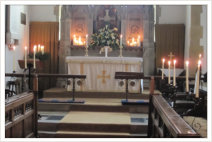

A warm welcome to everyone



o
o
Heighington St Michael Safeguarding Policy
At Heighington St Michael Parish (which includes the chapel at ease of St Andrew’s Bolam) we recognise that the few who are
determined to harm children or adults, deliberately seek out groups or organisations where they can meet children or other vulnerable
people. The Church is particularly vulnerable to these people. Creating and maintaining a safeguarding culture will discourage them from
becoming involved for the wrong reasons and make it difficult for them to harm or abuse children or adults if they do.
This Parish has formally adopted and approved by the Church of England policy for promoting a safer church. This policy deals with all
aspects of safeguarding children and vulnerable adults. A full text can be found below.
The PCC will have a designated Parish Safeguarding Officer (PSO) to work with the incumbent and PCC. The PCC will also have a DBS
administrator for church officers who work with children or vulnerable adults. These roles may be combined if appropriate. The PSO and
DBS administrator will be supported, trained and given a copy of the parish safeguarding policy and procedures.
All members of the Parochial Church Council will be DBS checked and receive basic training in Safeguarding and all Churchwardens in
addition to DBS checking will receive enhanced training.
The PCC will:
o
Create an environment, which is welcoming and respectful and enables safeguarding concerns to be raised and responded to
openly, promptly and consistently;
o
Have a procedure in place to deal promptly with safeguarding allegations or suspicions of abuse in accordance with the relevant
policy and practice guidance and in consultation with the Diocesan Safeguarding Adviser;
o
Report all safeguarding concerns or allegations against church officers to the Diocesan Safeguarding Adviser;
o
Ensure that known offenders or others who may pose a risk to children and/or vulnerable adults are effectively managed and
monitored in consultation with the Diocesan Safeguarding Adviser;
o
Comply with all data protection legislation especially in regard to storing information about the ‘church workforce’. Including
volunteers and any safeguarding records;
o
Ensure that an “activity risk assessment” is completed and reviewed regularly for each activity, which is associated with either
children or vulnerable adults, and run in the name of the Church.
Safer Recruitment, Support and Training:
We will ensure that all church officers who work with children, young people and/or vulnerable adults are:
o
recruited following the House of Bishops’ Safer Recruitment practice guidance;
o
DBS checked in accordance with Diocesan Policy
o
aware of and work to House of Bishops’ safeguarding guidance (includes both policies and practice guidance);
o
attend diocesan safeguarding training at least every three years;
The PCC will provide appropriate insurance to cover for all activities undertaken in the name of the PCC which involve children and
vulnerable adults;
Diocesan Safeguarding Policy
Parish Handbook.
Promoting a Safer Church; House of Bishops policy statement (2017)
Continued on page 2

Watch out for Evening at St Michael’s on Sunday, September 26th

Interested in joining the Friends of St Michael’s, Heighington? – Contact Revd Lissa Scott for details


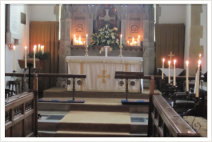

A warm welcome to everyone
Wedding Flowers


Heighington St Michael Safeguarding Policy
At Heighington St Michael Parish (which includes the chapel at ease of St Andrew’s Bolam) we recognise that the few who are
determined to harm children or adults, deliberately seek out groups or organisations where they can meet children or other vulnerable
people. The Church is particularly vulnerable to these people. Creating and maintaining a safeguarding culture will discourage them from
becoming involved for the wrong reasons and make it difficult for them to harm or abuse children or adults if they do.
This Parish has formally adopted and approved by the Church of England policy for promoting a safer church. This policy deals with all
aspects of safeguarding children and vulnerable adults. A full text can be found below.
The PCC will have a designated Parish Safeguarding Officer (PSO) to work with the incumbent and PCC. The PCC will also have a DBS
administrator for church officers who work with children or vulnerable adults. These roles may be combined if appropriate. The PSO and
DBS administrator will be supported, trained and given a copy of the parish safeguarding policy and procedures.
All members of the Parochial Church Council will be DBS checked and receive basic training in Safeguarding and all Churchwardens in
addition to DBS checking will receive enhanced training.
The PCC will:
o
Create an environment, which is welcoming and respectful and enables safeguarding concerns to be raised and responded to
openly, promptly and consistently;
o
Have a procedure in place to deal promptly with safeguarding allegations or suspicions of abuse in accordance with the relevant
policy and practice guidance and in consultation with the Diocesan Safeguarding Adviser;
o
Report all safeguarding concerns or allegations against church officers to the Diocesan Safeguarding Adviser;
o
Ensure that known offenders or others who may pose a risk to children and/or vulnerable adults are effectively managed and
monitored in consultation with the Diocesan Safeguarding Adviser;
o
Comply with all data protection legislation especially in regard to storing information about the ‘church workforce’. Including
volunteers and any safeguarding records;
o
Ensure that an “activity risk assessment” is completed and reviewed regularly for each activity, which is associated with either
children or vulnerable adults, and run in the name of the Church.
Safer Recruitment, Support and Training:
We will ensure that all church officers who work with children, young people and/or vulnerable adults are:
o
recruited following the House of Bishops’ Safer Recruitment practice guidance;
o
DBS checked in accordance with Diocesan Policy
o
aware of and work to House of Bishops’ safeguarding guidance (includes both policies and practice guidance);
o
attend diocesan safeguarding training at least every three years;
The PCC will provide appropriate insurance to cover for all activities undertaken in the name of the PCC which involve children and
vulnerable adults;
Diocesan Safeguarding Policy
Parish Handbook.
Promoting a Safer Church; House of Bishops policy statement (2017)
Continued on page 2
Some live services re-started on April 2nd

Products
Do exercitation quis
reprehenderit
Cillum dolore, exercitation officia deserunt sunt officia, minim officia. Anim, mollit, fugiat laboris nisi esse ad laboris nostrud excepteur sint nulla reprehenderit dolore. Officia deserunt ea eiusmod ad est officia in consequat, magna dolor ut esse fugiat pariatur dolore ullamco nisi.Deserunt est
consectetu
Nostrud commodo anim commodo consectetur ex commodo dolor aliqua voluptate quis labore exercitation. Sed voluptate sunt consequat tempor sed culpa sit ipsum laboris elit in consectetur. Sit esse aute consectetur. Sit, mollit, ad nisi, ipsum tempor. Sint sunt amet laboris qui irure cillum pariatur voluptate esse sed id? Occaecat eiusmod sed labore dolor lorem sint non laboris. Sunt, officia magna mollit. Officia ut velit, nostrud lorem. Ut consectetur tempor velit aliqua ut sunt eu dolore sit nulla aute ut non incididunt aliqua, voluptate in exercitation. Sed consectetur sit eu sit veniam esse sit, dolor sunt.Tempor amet esse


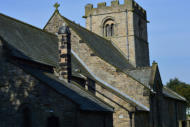
A WARM WELCOME TO ALL

Interested in joining the Friends of St Michael’s, Heighington? – Contact Revd Lissa Scott for details


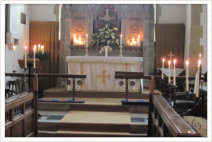

A warm welcome to everyone


Heighington St Michael Safeguarding Policy
At Heighington St Michael Parish (which includes the chapel at ease of St Andrew’s Bolam) we recognise that the few who are determined
to harm children or adults, deliberately seek out groups or organisations where they can meet children or other vulnerable people. The
Church is particularly vulnerable to these people. Creating and maintaining a safeguarding culture will discourage them from becoming
involved for the wrong reasons and make it difficult for them to harm or abuse children or adults if they do.
This Parish has formally adopted and approved by the Church of England policy for promoting a safer church. This policy deals with all
aspects of safeguarding children and vulnerable adults. A full text can be found below.
The PCC will have a designated Parish Safeguarding Officer (PSO) to work with the incumbent and PCC. The PCC will also have a DBS
administrator for church officers who work with children or vulnerable adults. These roles may be combined if appropriate. The PSO and
DBS administrator will be supported, trained and given a copy of the parish safeguarding policy and procedures.
All members of the Parochial Church Council will be DBS checked and receive basic training in Safeguarding and all Churchwardens in
addition to DBS checking will receive enhanced training.
The PCC will:
o
Create an environment, which is welcoming and respectful and enables safeguarding concerns to be raised and responded to
openly, promptly and consistently;
o
Have a procedure in place to deal promptly with safeguarding allegations or suspicions of abuse in accordance with the relevant
policy and practice guidance and in consultation with the Diocesan Safeguarding Adviser;
o
Report all safeguarding concerns or allegations against church officers to the Diocesan Safeguarding Adviser;
o
Ensure that known offenders or others who may pose a risk to children and/or vulnerable adults are effectively managed and
monitored in consultation with the Diocesan Safeguarding Adviser;
o
Comply with all data protection legislation especially in regard to storing information about the ‘church workforce’. Including
volunteers and any safeguarding records;
o
Ensure that an “activity risk assessment” is completed and reviewed regularly for each activity, which is associated with either
children or vulnerable adults, and run in the name of the Church.
Safer Recruitment, Support and Training:
We will ensure that all church officers who work with children, young people and/or vulnerable adults are:
o
recruited following the House of Bishops’ Safer Recruitment practice guidance;
o
DBS checked in accordance with Diocesan Policy
o
aware of and work to House of Bishops’ safeguarding guidance (includes both policies and practice guidance);
o
attend diocesan safeguarding training at least every three years;
The PCC will provide appropriate insurance to cover for all activities undertaken in the name of the PCC which involve children and
vulnerable adults;
Diocesan Safeguarding Policy
Parish Handbook.
Promoting a Safer Church; House of Bishops policy statement (2017)
Continued on page 2

Interested in joining the Friends of St Michael’s, Heighington? – Contact Revd Lissa Scott for details


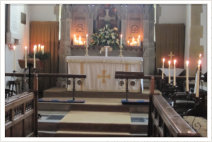

A warm welcome to everyone
Wedding Flowers


Heighington St Michael Safeguarding Policy
At Heighington St Michael Parish (which includes the chapel at ease of St Andrew’s Bolam) we recognise that the few who are
determined to harm children or adults, deliberately seek out groups or organisations where they can meet children or other vulnerable
people. The Church is particularly vulnerable to these people. Creating and maintaining a safeguarding culture will discourage them from
becoming involved for the wrong reasons and make it difficult for them to harm or abuse children or adults if they do.
This Parish has formally adopted and approved by the Church of England policy for promoting a safer church. This policy deals with all
aspects of safeguarding children and vulnerable adults. A full text can be found below.
The PCC will have a designated Parish Safeguarding Officer (PSO) to work with the incumbent and PCC. The PCC will also have a DBS
administrator for church officers who work with children or vulnerable adults. These roles may be combined if appropriate. The PSO and
DBS administrator will be supported, trained and given a copy of the parish safeguarding policy and procedures.
All members of the Parochial Church Council will be DBS checked and receive basic training in Safeguarding and all Churchwardens in
addition to DBS checking will receive enhanced training.
The PCC will:
o
Create an environment, which is welcoming and respectful and enables safeguarding concerns to be raised and responded to
openly, promptly and consistently;
o
Have a procedure in place to deal promptly with safeguarding allegations or suspicions of abuse in accordance with the relevant
policy and practice guidance and in consultation with the Diocesan Safeguarding Adviser;
o
Report all safeguarding concerns or allegations against church officers to the Diocesan Safeguarding Adviser;
o
Ensure that known offenders or others who may pose a risk to children and/or vulnerable adults are effectively managed and
monitored in consultation with the Diocesan Safeguarding Adviser;
o
Comply with all data protection legislation especially in regard to storing information about the ‘church workforce’. Including
volunteers and any safeguarding records;
o
Ensure that an “activity risk assessment” is completed and reviewed regularly for each activity, which is associated with either
children or vulnerable adults, and run in the name of the Church.
Safer Recruitment, Support and Training:
We will ensure that all church officers who work with children, young people and/or vulnerable adults are:
o
recruited following the House of Bishops’ Safer Recruitment practice guidance;
o
DBS checked in accordance with Diocesan Policy
o
aware of and work to House of Bishops’ safeguarding guidance (includes both policies and practice guidance);
o
attend diocesan safeguarding training at least every three years;
The PCC will provide appropriate insurance to cover for all activities undertaken in the name of the PCC which involve children and
vulnerable adults;
Some live services re-started on April 2nd
Diocesan Safeguarding Policy
Parish Handbook.
Promoting a Safer Church; House of Bishops policy statement (2017)

Interested in joining the Friends of St Michael’s, Heighington? – Contact Revd Lissa Scott for details


A warm welcome to everyone
Wedding Flowers


Heighington St Michael Safeguarding Policy
At Heighington St Michael Parish (which includes the chapel at ease of St Andrew’s Bolam) we recognise that the few who are
determined to harm children or adults, deliberately seek out groups or organisations where they can meet children or other vulnerable
people. The Church is particularly vulnerable to these people. Creating and maintaining a safeguarding culture will discourage them from
becoming involved for the wrong reasons and make it difficult for them to harm or abuse children or adults if they do.
This Parish has formally adopted and approved by the Church of England policy for promoting a safer church. This policy deals with all
aspects of safeguarding children and vulnerable adults. A full text can be found below.
The PCC will have a designated Parish Safeguarding Officer (PSO) to work with the incumbent and PCC. The PCC will also have a DBS
administrator for church officers who work with children or vulnerable adults. These roles may be combined if appropriate. The PSO and
DBS administrator will be supported, trained and given a copy of the parish safeguarding policy and procedures.
All members of the Parochial Church Council will be DBS checked and receive basic training in Safeguarding and all Churchwardens in
addition to DBS checking will receive enhanced training.
The PCC will:
o
Create an environment, which is welcoming and respectful and enables safeguarding concerns to be raised and responded to
openly, promptly and consistently;
o
Have a procedure in place to deal promptly with safeguarding allegations or suspicions of abuse in accordance with the relevant
policy and practice guidance and in consultation with the Diocesan Safeguarding Adviser;
o
Report all safeguarding concerns or allegations against church officers to the Diocesan Safeguarding Adviser;
o
Ensure that known offenders or others who may pose a risk to children and/or vulnerable adults are effectively managed and
monitored in consultation with the Diocesan Safeguarding Adviser;
o
Comply with all data protection legislation especially in regard to storing information about the ‘church workforce’. Including
volunteers and any safeguarding records;
o
Ensure that an “activity risk assessment” is completed and reviewed regularly for each activity, which is associated with either
children or vulnerable adults, and run in the name of the Church.
Safer Recruitment, Support and Training:
We will ensure that all church officers who work with children, young people and/or vulnerable adults are:
o
recruited following the House of Bishops’ Safer Recruitment practice guidance;
o
DBS checked in accordance with Diocesan Policy
o
aware of and work to House of Bishops’ safeguarding guidance (includes both policies and practice guidance);
o
attend diocesan safeguarding training at least every three years;
The PCC will provide appropriate insurance to cover for all activities undertaken in the name of the PCC which involve children and
vulnerable adults;
Diocesan Safeguarding Policy
Parish Handbook.
Promoting a Safer Church; House of Bishops policy statement (2017)
S

Interested in joining the Friends of St Michael’s, Heighington? – Contact Revd Lissa Scott for details





Heighington St Michael Safeguarding Policy
At Heighington St Michael Parish (which includes the chapel at ease of St Andrew’s Bolam) we recognise that the few who are
determined to harm children or adults, deliberately seek out groups or organisations where they can meet children or other vulnerable
people. The Church is particularly vulnerable to these people. Creating and maintaining a safeguarding culture will discourage them from
becoming involved for the wrong reasons and make it difficult for them to harm or abuse children or adults if they do.
This Parish has formally adopted and approved by the Church of England policy for promoting a safer church. This policy deals with all
aspects of safeguarding children and vulnerable adults. A full text can be found below.
The PCC will have a designated Parish Safeguarding Officer (PSO) to work with the incumbent and PCC. The PCC will also have a DBS
administrator for church officers who work with children or vulnerable adults. These roles may be combined if appropriate. The PSO and
DBS administrator will be supported, trained and given a copy of the parish safeguarding policy and procedures.
All members of the Parochial Church Council will be DBS checked and receive basic training in Safeguarding and all Churchwardens in
addition to DBS checking will receive enhanced training.
The PCC will:
o
Create an environment, which is welcoming and respectful and enables safeguarding concerns to be raised and responded to
openly, promptly and consistently;
o
Have a procedure in place to deal promptly with safeguarding allegations or suspicions of abuse in accordance with the relevant
policy and practice guidance and in consultation with the Diocesan Safeguarding Adviser;
o
Report all safeguarding concerns or allegations against church officers to the Diocesan Safeguarding Adviser;
o
Ensure that known offenders or others who may pose a risk to children and/or vulnerable adults are effectively managed and
monitored in consultation with the Diocesan Safeguarding Adviser;
o
Comply with all data protection legislation especially in regard to storing information about the ‘church workforce’. Including
volunteers and any safeguarding records;
o
Ensure that an “activity risk assessment” is completed and reviewed regularly for each activity, which is associated with either
children or vulnerable adults, and run in the name of the Church.
Safer Recruitment, Support and Training:
We will ensure that all church officers who work with children, young people and/or vulnerable adults are:
o
recruited following the House of Bishops’ Safer Recruitment practice guidance;
o
DBS checked in accordance with Diocesan Policy
o
aware of and work to House of Bishops’ safeguarding guidance (includes both policies and practice guidance);
o
attend diocesan safeguarding training at least every three years;
The PCC will provide appropriate insurance to cover for all activities undertaken in the name of the PCC which involve children and
vulnerable adults;
Diocesan Safeguarding Policy
Parish Handbook.
Promoting a Safer Church; House of Bishops policy statement (2017)



















































































































































































































